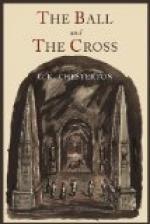And he fell on guard. Turnbull was busy settling something loose in his elaborate hilt, and the pause was broken by the stranger.
“Suppose I call the police?” he said, with a heated face.
“And deny your most sacred dogma,” said MacIan.
“Dogma!” cried the man, in a sort of dismay. “Oh, we have no dogmas, you know!”
There was another silence, and he said again, airily:
“You know, I think, there’s something in what Shaw teaches about no moral principles being quite fixed. Have you ever read The Quintessence of Ibsenism? Of course he went very wrong over the war.”
Turnbull, with a bent, flushed face, was tying up the loose piece of the pommel with string. With the string in his teeth, he said, “Oh, make up your damned mind and clear out!”
“It’s a serious thing,” said the philosopher, shaking his head. “I must be alone and consider which is the higher point of view. I rather feel that in a case so extreme as this...” and he went slowly away. As he disappeared among the trees, they heard him murmuring in a sing-song voice, “New occasions teach new duties,” out of a poem by James Russell Lowell.
“Ah,” said MacIan, drawing a deep breath. “Don’t you believe in prayer now? I prayed for an angel.”
“An hour ago,” said the Highlander, in his heavy meditative voice, “I felt the devil weakening my heart and my oath against you, and I prayed that God would send an angel to my aid.”
“Well?” inquired the other, finishing his mending and wrapping the rest of the string round his hand to get a firmer grip.
“Well?”
“Well, that man was an angel,” said MacIan.
“I didn’t know they were as bad as that,” answered Turnbull.
“We know that devils sometimes quote Scripture and counterfeit good,” replied the mystic. “Why should not angels sometimes come to show us the black abyss of evil on whose brink we stand. If that man had not tried to stop us...I might...I might have stopped.”
“I know what you mean,” said Turnbull, grimly.




